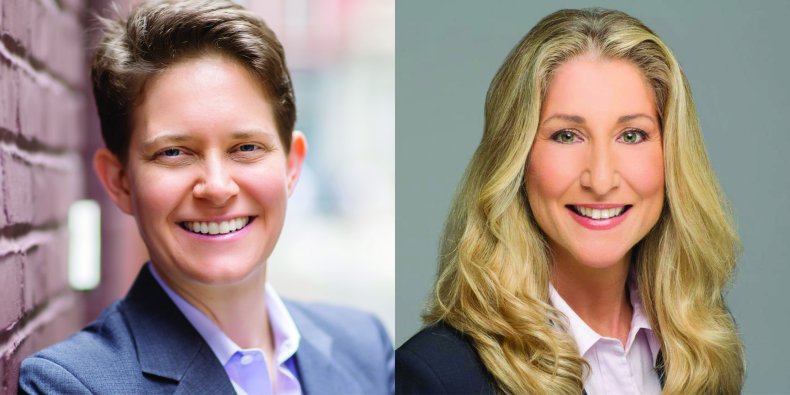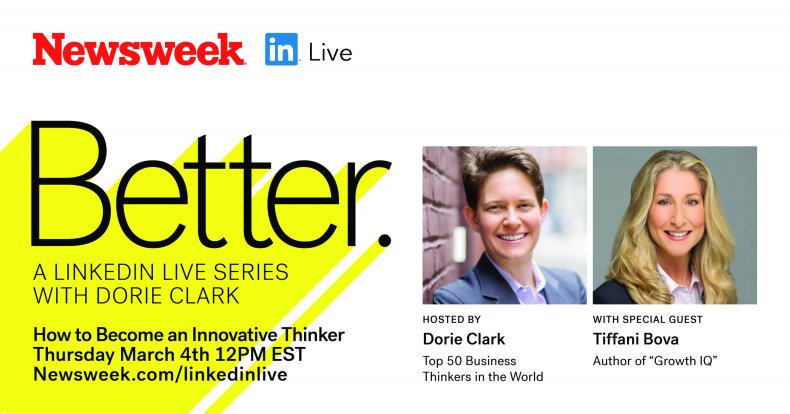How to Jump-Start Your Career During, and After, the Pandemic
It comes as no surprise that employees, at companies big and small, have struggled to do their jobs during the COVID-19 pandemic—not to mention trying to stay creative and work on skills that will prepare them for the future. Even as the pandemic, fingers crossed, seems to be on the wane, many of those issues still remain for most of us.
In other words: the very future of work remains cloudy. But no need to panic. To get some advice on all of that—and a lot of other career topics—I asked Tiffani Bova to weigh in. Tiffani is an evangelist of growth and innovation for the California-based software giant, Salesforce.com. She's also a Wall Street Journal bestselling author and the writer of a fairly new book, Growth IQ: Get Smarter About the Choices that Will Make or Break Your Business.
I interviewed Bova as part of my Newsweek/LinkedIn interview series, Better, where I talk with business leaders, authors and founders about their latest innovative ideas and trends. (We also take questions from viewers during the livestream.) The pandemic experience has "been devastating and inspiring at the same time, and I'm just looking forward to some sense of what the next future is going to look like, because I'm not a fan of the new normal," Bova told me. But, she added, "I don't think we should aspire to go back to the way it was."
Here are some takeaways and highlights, edited for clarity, from my conversation with Tiffani.
Yes, You Can Still Carve Out a Side Hustle
Everyone's struggling with how they do their job today and also prepare for what are they going to do in the future. One piece of advice: be committed to the process, whatever that process might be. Take time out of every single day to learn something new or try something new.
For example, let's say you want to become a thought leader. "Thought leadership" is when other people view what you're putting out as being challenging and unique and gets you to think differently about the things you're doing every day. If you can start to really work out that muscle over time, you'll get better and better and find your voice—and then find what resonates with people besides yourself. But the first step is you have to take the first step. For instance, create a newsletter that, say, you distribute to your kid's high school. Create a video for YouTube.
But remember, you have to earn your stripes. And, at the same time, always remain true to who you are. Make sure your personality is reflected in what you do, no matter what the format—be it an old school print newsletter, an article in Medium or a YouTube seminar.

Creativity in the Age of the Home Office
My advice for you: Carve out a half an hour twice a day where you unplug and step away from your desk. If you're still working from home, walk around the block and give yourself some fresh air. Give yourself permission and time to think about things.
Otherwise, you're just not going to be fresh with ideas. I used to get all my thinking time on airplanes. I don't have that time anymore. So, I have to try and recreate space in my day where I can go out there and think. I actually block time on my calendar, a half hour in the morning; a half hour in the afternoon. I'll just listen to music or I'll listen to nothing. I just want to give my mind a break.
My advice for business owners: If you're a small business, for example, maybe create a mandate where meetings are 25 minutes, not 60 minutes. Give time back to your employees. At Salesforce we have "no meeting Thursdays." Importantly, be supportive of giving people the break. Don't pretend to have a policy and then not follow-through in reality.
Happy Employees = Happy Customers
Not so long ago, employee experience used to mean something very different. Before the pandemic, it might have been related to perks like free lunch and foosball. Now, employee experience is something totally different. For instance: "How do you make sure people feel safe and welcome and connected to people that they work with on a day-to-day basis?" That opened up an entirely different conversation around employee experience.
I believed, and believe, that employee experience would drive better customer experience and that would drive greater growth for businesses. So, we went out and did primary research and sure enough companies that had a better and stronger employee experience had a better and stronger customer experience. Their growth rate was 1.8 times more than similar companies. So, I say that the fastest way to get customers to love your brand is to get employees to love their job.
Learning How to Grow
During my years of advising companies, I used to always hear this: "Boy, we're having trouble growing the business." And the solutions were always the same, too: spend more on marketing, hire more salespeople and cut costs. Those were three levers businesses would pull.
And I would say, "there have to be other ways." I wanted to use their IQ; their smarts. You know, you don't need to out-R&D your rivals, you don't need to outspend them—you need to out-think your competition.
Now, to be sure, all those things have to happen: you have to spend money and you have to hire the right people. But doing it at the right time, doing it in the right combination and doing it for what's right for your business in the context of your market. Not just going out and replicating what your competition does. So, in my book I boiled it down to 10 paths to growth. (Editor's note: Read Bova's book!)
Must Reads
When I was writing my book, I actually read 75 of the best business books ever written. That was my homework assignment. I literally said, what did I like about the book, what I didn't like about the book, what was missing, the tone and the feel. I reread so many of the ones that I had read historically, In Search of Excellence, Strategy, Crossing the Chasm, Good to Great, those classics. Martin Lindstrom's The Ministry of Common Sense is a great book too.
I found that the technology books were a problem, though. If you know anything about the traditional publishing business, you know that by the time the book is published, the technology, or the story of that hot thing, is almost 18 months old. So, if you can find some real-time self-published books that are out there on what's happening—could be on bitcoin, for instance, or blockchain, I'd look to that. There's so much happening in technology so quickly that I think podcasts and newsletters and YouTube and social media may be better for keeping up.
The Small Business "Digital Renaissance"
Very quickly overnight, things that small businesses might have resisted when it comes to technology changed. Why? They felt that it was too much for them. They didn't need it. They had a small community business. It was referrals and everyone kept coming back. And then they realized after COVID-19 that, boom, the doors were closed. And, "oh, I don't actually know my customers' names and their contact information. I'm not able to actually let them know that we're doing delivery for our restaurants. My menu isn't even online." All of those things weren't being done.
But so many people, and quickly, were just up for the challenge. It could be something as small as, literally, putting up a website or making a partnership with a delivery service. All of a sudden, all those investments that hadn't been made over the last five, seven, 10 years came rushing through. The black swan event was this catalyst for this huge digital renaissance that we had been talking about for so long. But yet, so many didn't understand the value until it was forced upon them.
Dorie Clark, author of Entrepreneurial You and Duke University Fuqua School of Business professor, hosts Newsweek's weekly interview series, Better, on Thursdays at 12 p.m. ET/9 a.m. PT at newsweek.com/linkedinlive. Sign up for updates at dorieclark.com.


